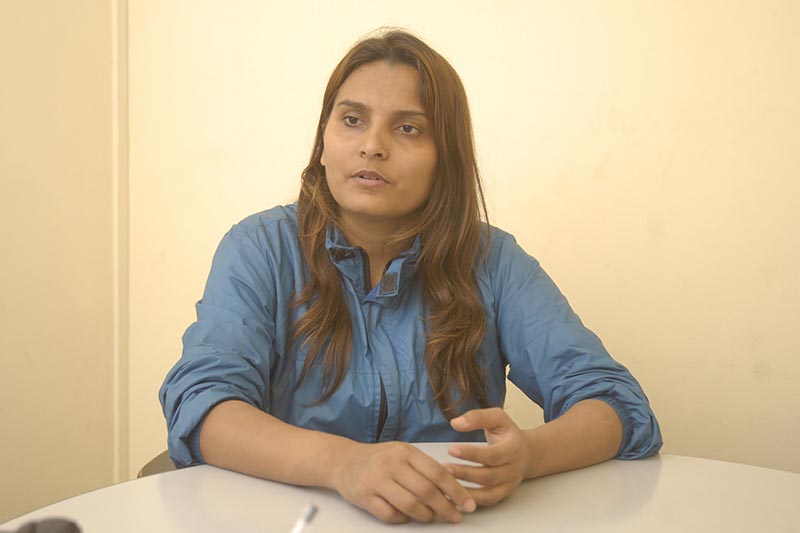Parkinson's Disease: Degenerative and Progressive
Nine years ago, Tirtha Raj Pandit, 51, from Gaidakot, Nawalparasi experienced “difficulty in walking and rigidity on the left part of my body”. He was diagnosed with Parkinson's Disease and has been under medical advice and treatment for the last nine years.
"Parkinson's Disease is a neuro-degenerative disease. In this condition, certain parts of the brain becomes old quickly,” informed Dr Resha Shrestha Karmacharya, Neurosurgeon at Annapurna Neurological Institute and Allied Sciences, Maitighar.
“Brain cells produce dopamine — a chemical that relays messages between the substantia nigra (an area in brain) and other parts of the brain to control movements of the human body; it also helps in muscle movements. When there is a lack of dopamine in the human brain, then a person’s ability to regulate his/her body movements and emotions lessen. When the brain cells degenerate, dopamine lessens because of which a patient shows symptoms of rigidity, difficulty in movement, shaking of the hands and feet, among others,” she explained.
On March 29, a deep brain stimulation (DBS) was performed on Pandit. As per Shrestha Karmacharya, DBS is a surgery that is used to treat the symptoms of Parkinson’s — tremor, stiffness, slowed movement, rigidity and walking difficulties.
“The symptoms vary according to patients,” pointed out Dr Shrestha Karmacharya. And its symptoms include tremor of the hands, arms, legs, jaw and face, slowness of movement, rigidity or stiffness of the limbs, impaired balance and co-ordination and loss of facial expression — expressions of happiness and sadness on face can’t even be recognised, among others.
Progressive and idiopathic
Parkinson's Disease is a chronic and progressive movement disorder. “It is the disease whose symptoms continue and worsen over time,” Dr Shrestha Karmacharya informed.
Moreover, there is no cure for the disease at present, but fortunately there are treatment options such as medication and surgery to manage the symptoms.
“We started DBS since 2014,” informed the doctor. “DBS uses a surgically implanted, battery-operated medical device. It helps to deliver electrical stimulation to areas in the brain that control movement, tremor including other symptoms of Parkinson’s. The battery life of DBS is around 9-10 years and one can even put the battery on/off and change the frequency.”
Lesioning can also be performed for the treatment of symptoms, as per Dr Shrestha Karmacharya which would cost Rs 2-3 lakhs; DBS is expensive costing around Rs 20 lakhs.
Nepal’s renowned actor/comedian Madan Krishna Shrestha was diagnosed with Parkinson’s Disease eight years ago, and he has got DBS.
“I used to drag my feet when I walked. I felt like I was falling down while walking because I did not have control over my body. My voice had become low,” revealed the actor adding. “I do feel those now too, but DBS has alleviated the symptoms.”
Parkinson's Disease is also an idiopathic disease. “The symptoms of Parkinson's arises spontaneously and the cause is unknown,” Dr Shrestha Karmacharya explained.
Parkinson's Disease can be passed from one generation to the other.
“About 15 per cent of the cases of Parkinson’s are thought to be genetic forms of the disease. An exact cause for other 85 per cent remains unknown,” revealed the doctor.
Age is one of the biggest risk factors for Parkinson's Disease. According to Shrestha Karmacharya, Parkinson’s usually occurs after the ages of 50, 60 or 70 years because of the ageing of the brain and its function. However, this disease is being seen in people before the age of 35-45. Banita Khanal, 33, is one of them — she was diagnosed with Parkinson’s when she was 26 where “the cause was unidentified”.
In addition, “Insecticides and pesticides have also been associated with the disease. Moreover, childhood trauma to the brain is also linked with Parkinson’s Disease.”
Coping with the disease
There is no cure for Parkinson's Disease. But patients have to be taken care of; if not, they are likely to suffer more.
“If left untreated, people are likely to suffer from emotional disturbances, depression, and difficulty in swallowing, loss of memory, among others,” Dr Shrestha Karmacharya pointed out. “That is why family support for patients is necessary as the patient becomes very much dependent on his/her caretakers.”
Another way to help patients are exercise.
“Exercising is helpful for patients. It helps me a lot. It helps me in good movement of my body parts,” actor Shrestha shared.
If Parkinson's Disease is detected early, it is helpful as medication can be started early. “Therefore, those with shaking body parts and rigidity must visit the doctor for early diagnosis of the disease,” suggested the doctor.






